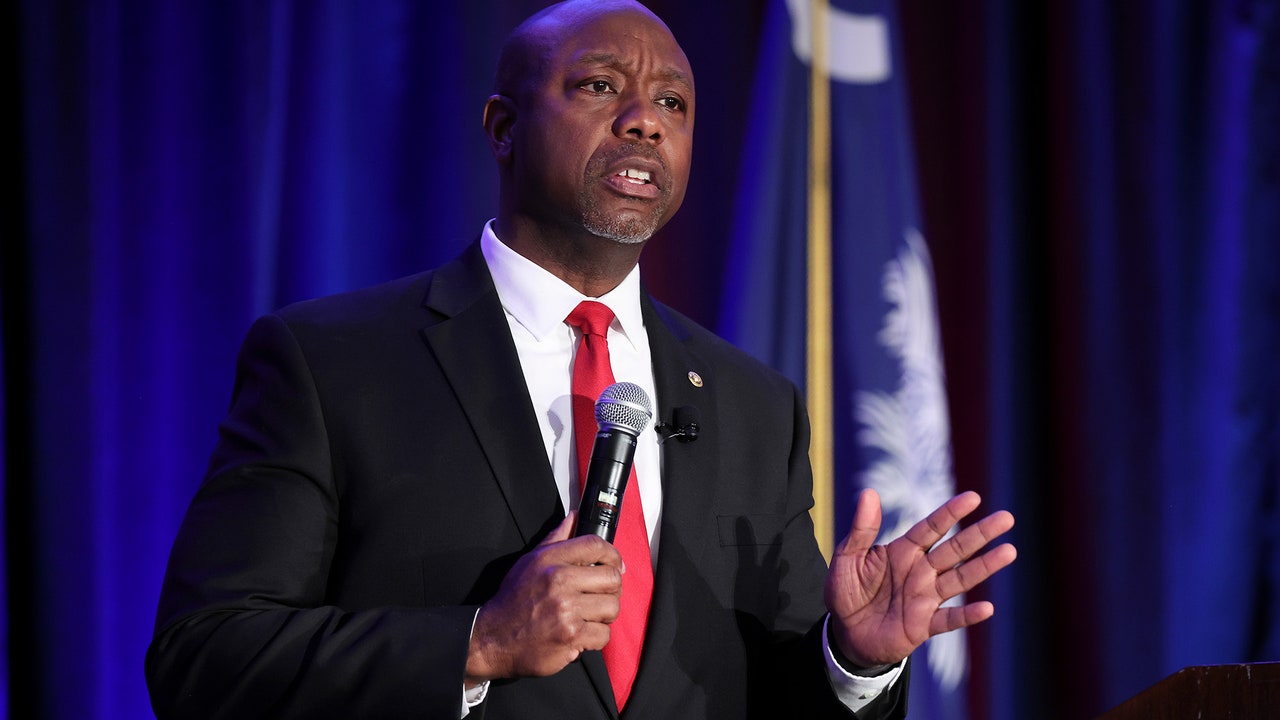[ad_1]
The 2024 Republican primary is still in its beginning stages, but the once-sparse evangelical lane is already turning into a multicandidate pileup. On Wednesday, Senator Tim Scott of South Carolina became the latest Republican to drape his presidential ambitions in religious branding, following a trail already blazed by former vice president Mike Pence, former South Carolina governor Nikki Haley, and—to a lesser extent—Florida governor Ron DeSantis.
“I will defend the Judeo-Christian foundation our nation is built on and protect our religious liberty,” Scott declared in a video announcing his exploratory committee. Touting his antiabortion record, he also promised to “protect our most fundamental right: the right to life itself.” And in his first public event since launching his exploratory committee, per Politico, Scott met with a group of pastors and homeschool families in Iowa, home to the GOP’s first-in-the-nation primary caucus.
Twitter content
This content can also be viewed on the site it originates from.
In past elections, this message may have positioned Scott alongside former Arkansas governor Mike Huckabee in 2008 or former senator Rick Santorum of Pennsylvania in 2012, whose campaigns typified a bygone era in which evangelical candidates were relatively novel. However, as Republicans have increasingly raced to the right on social issues, that paradigm now appears to have flipped, putting Scott up against a raft of competition.
After launching her campaign in February, Haley has likewise embarked on an evangelical messaging blitz, appearing alongside celebrity pastors, speaking at Christian universities, and meeting with evangelical political groups. One of her only notable backers so far is John Hagee, an infamous televangelist routinely courted by Republican presidential hopefuls.
Meanwhile, Pence—whose history in evangelical politics spans decades—has employed a similar strategy, speaking at numerous evangelical institutions to promote So Help Me God, a memoir of his time in the White House. Last month, he even used faith to poke fun at Donald Trump, far and away the favorite for the Republican nomination. “I read that some of those classified documents they found at Mar-a-Lago were actually stuck in the president’s Bible,” Pence said, “which proves he had absolutely no idea they were there.”
In the aftermath of the GOP’s disappointing midterm last year, several evangelical leaders launched their own broadsides against Trump, who they believe will sink the party in 2024 should he secure the nomination. But there is little evidence suggesting that the conservative base has taken these warnings to heart: Trump, despite his ever-growing legal woes, continues to make steady gains among likely Republican voters, according to data from FiveThirtyEight, which estimates his support at nearly 50%. Pence and Haley, meanwhile, are hovering in the mid-to-low single digits, while, according to Time, Scott is polling at roughly 1% nationally. Even in his home state, the appetite for “Tim Scott 2024” is marginal: A recent Winthrop University survey of likely Republican voters in South Carolina had him at only 7%, 11 points below Haley.
But that poor showing has not shaken Scott’s confidence. Asked whether he would support Trump if he wins the Republican nomination, Scott told CBS News on Wednesday, “I plan on being the nominee. Obviously, I have an exploratory committee moving forward.”
While Scott has tried to position himself as a bipartisan problem solver in Washington, the three-minute ad he released Wednesday tested a far more combative message. In it, the senator can be seen strolling past retired batteries stationed on Fort Sumter, the South Carolina island attacked by Confederate forces in the opening shots of the Civil War. Just as in 1861, Scott argued, America is being strained by internal divisions—a split fomented by “Joe Biden and the radical left” in an attempt to consolidate their power. The spot ended with an evangelical battle cry of sorts: “This is a fight we must win, and that will take faith,” Scott said. “Faith in God.”
[ad_2]
Source link
